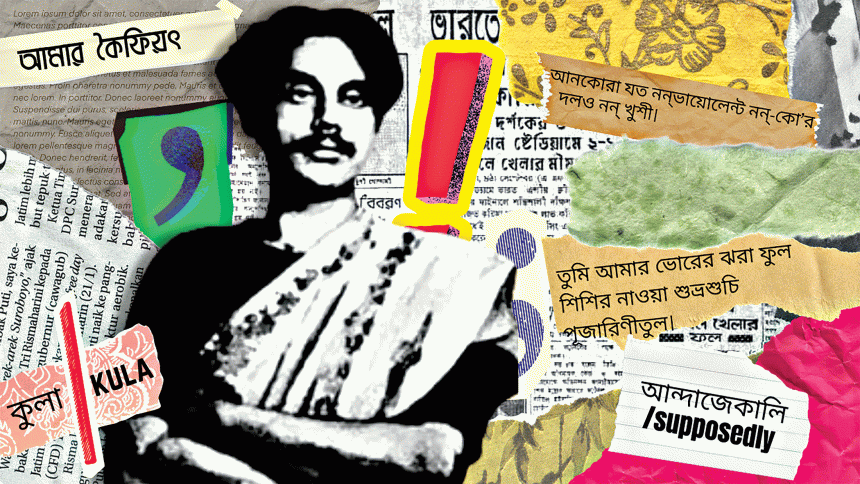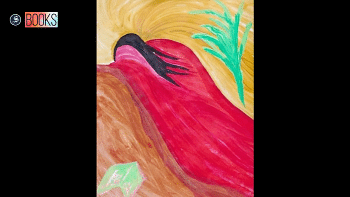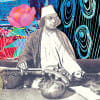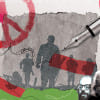Why Nazrul was at loggerheads with language purists

I proposed a panel at a North American Bangla literary conference. 'Is translation itself a form of activism?' I queried. Or rather, the title was 'Onubaad-o ki ek dhoroner activism?' Although I withdrew myself from the conference in the end, the English word in the Bangla title ruffled the feathers of a Toronto-based Bangla literary magazine editor. He insisted that I substitute 'activism' with shakriyotabaad. One can mark his chivalric anxiety about safeguarding the chastity of the Bangla language.
But does the Bangla term convey the intended message? Is the audience familiar with it? How many words do we use in our daily speech that are original Bangla? Native Bangla is limited to household tools such as dheki (paddy husker), kula, etc. For business and official purposes, we generally use Arabic, Persian, and Urdu words assimilated into Bangla like sugar in milk. Kazi Nazrul Islam, in his time, regularly raised the ire of linguistic purists for using Arabic-Persian words in his writings. To his amusement, he quipped, "Well then, from now on, I may use 'bicharaloy' instead of 'adalat', but what will I replace 'nazir', 'peshkar', 'ukil' and 'moktar' with?"
His knowledge of Islam and Hinduism parallels the two worlds in his poems like "Bidrohi" (The Rebel) where the winged horse called Buraq meets the seven-headed flying horse called Uchchaihshravas, and Shiva's horn finds Israfil's trumpet.
Like the English word in my panel title, Nazrul infused English expressions like 'non-violent', 'non-co' or 'non-coperators', and 'propaganda', inter alia, into his poetry and prose. 'Ankora joto non-violent non-co-er dol-o non khushi' [Nor are the raw non-violent non-co-operators pleased with me], he defended his political position as a poet in "Amar Kaifiyat" (My Explanation). When he adapted English expressions, did he contaminate Bangla?
Nazrul impregnated Bangla with borrowed words from Sanskrit, Arabic, Persian, Hindi, and Urdu. When purists perceive foreign influence as a threat to Bangla's existence, we can turn to Nazrul to understand how loanwords enrich and embellish a language instead of corrupting it.
Nazrul introduced and invented an avalanche of new words of Persian-Arabic roots; some of them stood the test of time while others perished. Through his writings, abundant borrowings blossomed in the tree of Bangla literature, but only a handful turned into apples. When Nazrul used khosh ilhaan to denote the melodious tune of a nightingale, the borrowing fits effortlessly in a Bangla poem "subh-e-ummiid" (dawning of hope), 'Pahari torur shukno shakhay/ Gaahe bulbul khosh ilhaan' [On the dry bough of a mountain tree/ A nightingale sings a melodious tune].
What fascinates me the most is his wordplay. Later, we find Shibram Chakraborty following in his footsteps, particularly in the use of puns. A workshop on Nazrul organised by the International Mother Language Institute and Kabi Nazrul Institute enumerates his play on words. Phrases like andajikaally or supposedly (rhymes with whimsically); ejidi or cruel mirroring daradi or compassionate; bondhujo echoing atmajou or offspring; and Oman Katoli imitating Roman Catholic, etc. offer a window to his witticism.
No wonder Nazrul's sway over Persian and Arabic grew during his posting in the Karachi cantonment in 1917. There, a Punjabi Muslim cleric opened the world of Hafiz, Omar Khayyam, and Rumi to him. Under the cleric's care, Nazrul became proficient in Farsi and subsequently rendered the Rubaiyats of Hafiz and Omar Khayyam directly from Persian to Bangla in the 1930s. His knowledge of Islam and Hinduism parallels the two worlds in his poems like "Bidrohi" (The Rebel) where the winged horse called Buraq meets the seven-headed flying horse called Uchchaihshravas, and Shiva's horn finds Israfil's trumpet.
Obviously, Nazrul ticked off the purists. Addressing them, he wrote, 'Hindura bhabe, Parsi-shobde kobita lekhe, O paa'at nere!' [And the Hindus think: 'This man uses Persian words in his poems. He must be the worst type of Muslim]. Even Rabindranath Tagore resented Nazrul's use of the word khun. Khun stands for murder in Bangla and blood in Persian. Nazrul viewed this attack on the use of khun as emblematic of Hindu cultural chauvinism, claims Debjani Sengupta in Niaz Zaman-edited Kazi Nazrul Islam: Poetry, Politics, Passion.
At length, Pramatha Chaudhuri had to step in to reconcile the two poets. Drawing a common ground between them, he wrote "Bongo Sahitye Khuner Mamla" (The Case of 'Blood' in Bengali Literature). It is not unlikely for Chaudhuri to intervene in the language debate given that he faced constant backlash from formalists for spearheading a colloquial language movement. His Sabuj Patra, a literary journal founded in 1914, transformed Bangla prose from Sanskritised sadhu bhasha into the colloquial chalito bhasha.
In other words, Bengal is not unfamiliar with resistance to linguistic change. But language is an organism whose growth and change mark its life. It is a river obstructing whose flow with the dam of codified rules and artificiality causes its death.
This article draws from the English rendition of Kazi Nazrul Islam's poetry from The Rebel and Other Poems translated by Basudha Chakravarty.
Shahroza Nahrin co-translated Life and Political Reality: Two Novellas (HarperCollins India, 2022) with V Ramaswamy.

 For all latest news, follow The Daily Star's Google News channel.
For all latest news, follow The Daily Star's Google News channel. 








Comments